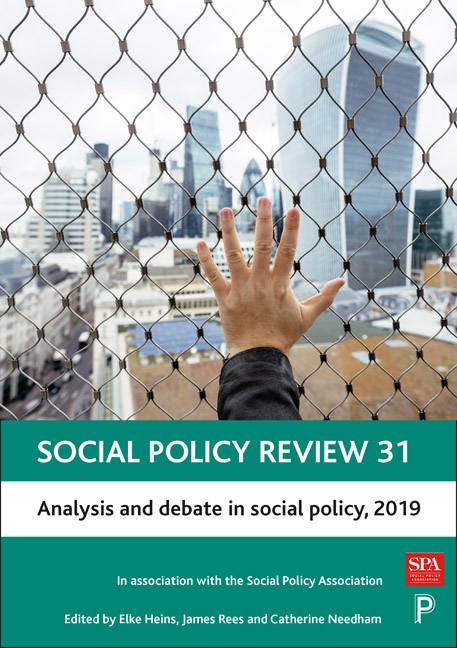Part II - Developments in social policy and contributions from the Social Policy Association Conference 2018
Published online by Cambridge University Press: 30 April 2022
Summary
The limitations of public policy can often be exemplified by high-profile scandals and news stories, which contain within them multiple policy failings. In 2017, that was the Grenfell fire. In 2018, it could be argued that it was the treatment of people from the so-called Windrush Generation – people who arrived from the Caribbean in the post-war era and were facing detention or deportation due to recent changes to immigration law. This exemplified the ‘hostile environment’ that had been a deliberate aspect of recent Home Office policy, and for many people, it was also linked to the broader rise of racist incidents that have been recorded since the 2016 Brexit referendum, as well as the rise of populist and anti-immigrant politics more broadly.
It is therefore timely that Andy Jolly's chapter, which starts this section, focuses on a related issue that has received much less attention in the public and academic debate: the treatment of people from what he calls the Air Jamaica generation, who came to the UK from the Commonwealth after the Immigration Act 1971. As Jolly explains, ‘families in the post-Windrush era did not come as British passport holders, but were “subject to immigration control”, with no recourse to public funds’ and thus risked becoming undocumented if they overstayed the length of their visa. He shows that children of this generation are often invisible in social policy discussions because they lack the legal right to paid employment and are subject to the no recourse to public funds (NRPF) rule. This excludes them from accessing welfare provision, including most social security benefits, council housing and homelessness assistance. The chapter draws on a unique empirical analysis of data relating to support under section 17 of the Children Act 1989, one of the few welfare entitlements that children and families with NRPF retain, finding that support varies widely and is ‘all but invisible’ in policy debate. Ultimately, he argues that without access to mainstream social security, section 17 is an inadequate safety net to prevent poverty. This, in turn, stems from discriminatory legislation and policy, resulting in a situation that can reasonably be called ‘statutory neglect’.
- Type
- Chapter
- Information
- Social Policy Review 31Analysis and Debate in Social Policy, 2019, pp. 125 - 128Publisher: Bristol University PressPrint publication year: 2019



